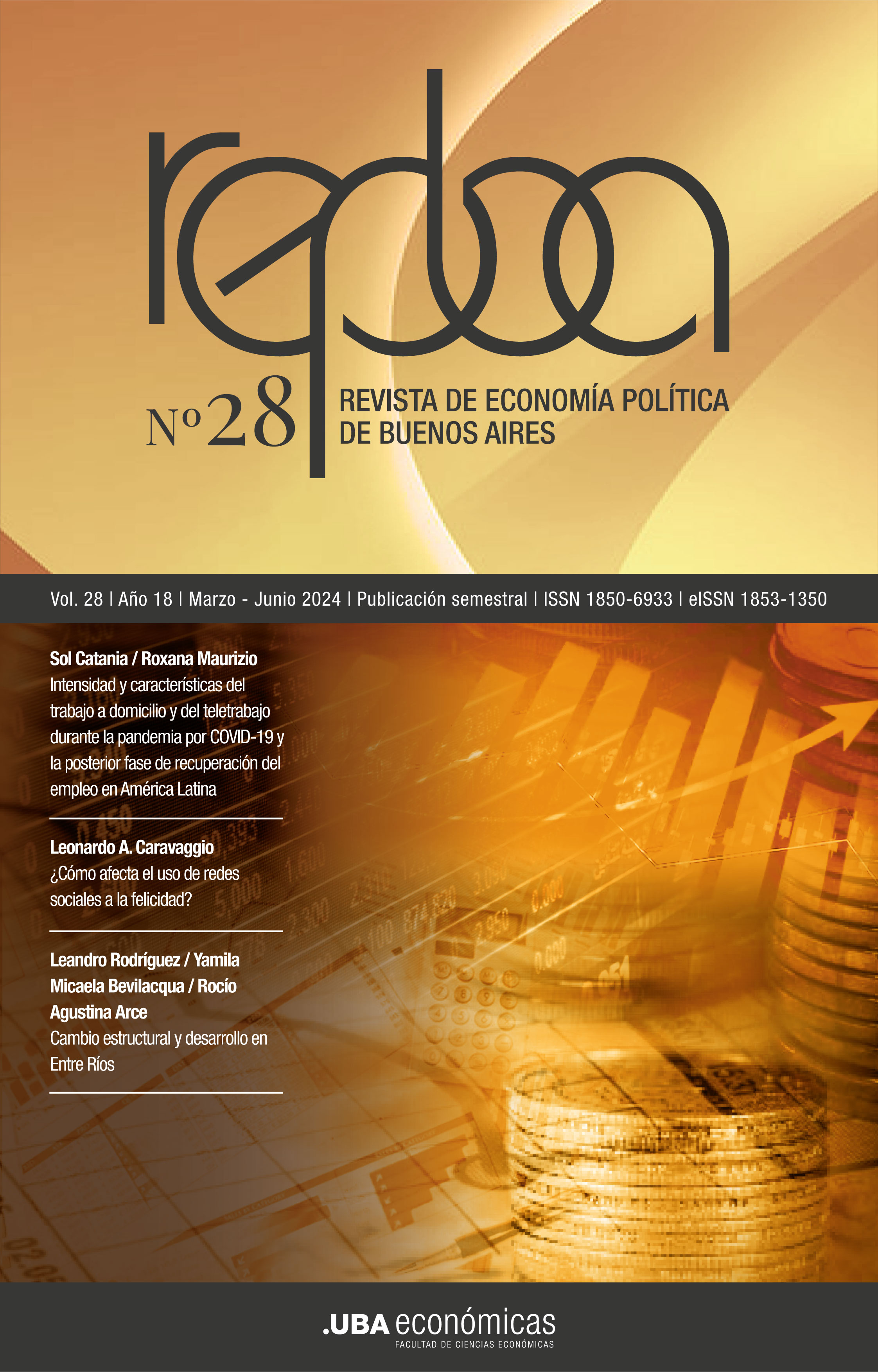¿Cómo afecta el uso de redes sociales a la felicidad?
Resumen
Se analiza el impacto del uso de redes sociales en el bienestar subjetivo de la población latinoamericana frente a la irrupción de la pandemia de COVID19. Dado el fuerte proceso de digitalización de la vida como consecuencia de la pandemia (por medidas restrictivas y decisiones de cuidado), se analizan los efectos causales del uso de redes sociales en el bienestar. Por primera vez se analiza el caso particular de la pandemia de COVID-19, para Latinoamérica y con una novel estrategia empírica. Se utiliza un modelo de regresión cuantílica con variables instrumentales, esto permite considerar el efecto causal y evitar la endogeneidad de ambas variables (utilizando la tenencia de smartphone como instrumento), y el impacto a lo largo de la distribución de bienestar. Este conocimiento permitiría adoptar políticas públicas mejor direccionadas.
Descargas
Citas
Antoci, A., Sabatini, F., & Sarracino, F. (2018). Online networks, social interaction and segregation: An evolutionary approach. Journal of Evolutionary Economics, 28. Disponible en https://doi.org/10.1007/s00191-018-0556-6
Bekalu, M. A., McCloud, R. F., & Viswanath, K. (2019). Association of social media use with social well-being, positive mental health, and self-rated health: Disentangling routine use from emotional connection to use. Health Education & Behavior, 46(2 suppl), 69S-80S. Disponible en https://doi.org/10.1177/
Bruni, L., & Porta, P. (2007). Handbook on the economics of happiness.
Bruni, L., & Stanca, L. (2008). Watching alone: Relational goods, television and happiness. Journal of Economic Behavior & Organization, 65(3), 506-528. Disponible en https://doi.org/10.1016/j.jebo.2005.12.005
Chengbo, l., Chi, I., Zhang, X., Cheng, Z., Zhang, L., & Chen, G. (2014). Urban and rural factors associated with life satisfaction among older chinese adults. Aging & mental health, 19, 1-8. Disponble en https://doi.org/10.1080/13607863.2014.977767
Chernozhukov, V., & Hansen, C. (2005). An IV model of quantile treatment effects. Econometrica, 73(1), 245-261. Disponible en https://doi.org/10.1111/j.1468-0262.2005.00570.x
----. (2006). Instrumental quantile regression inference for structural and treatment effect models. Journal of Econometrics, 132, 491-525. Disponible en https://doi.org/10.1016/j.jeconom.2005.02.009
----. (2008). Instrumental variable quantile regression: A robust inference approach. Journal of Econometrics, 142(1), 379-398.
Disponible en https://doi.org/10.1016/j.jeconom.2007.06.005
Choi, S., & Lehto, X. Y. (2009). Internet use as a leisure pastime. International Journal of Tourism Sciences, 9(3), 49-72. Disponible en https://doi.org/10.1080/15980634.2009.11434618
Clark, J., Algoe, S., & Green, M. (2017). Social network sites and well-being: The role of social connection. Current Directions in Psychological Science, 27. Disponible en https://doi.org/10.1177/0963721417730833
Diener, E., & Chan, M. Y. (2011). Happy people live longer: Subjective well-being contributes to health and longevity. Applied Psychology: Health and WellBeing, 3(1), 1-43. Disponible en https://doi.org/10.1111/j.1758-0854.2010.01045.x
Easterlin, R. (2021). An economist’s lessons on happiness, farewell dismal science! Disponible en https://doi.org/10.1007/978-3-030-61962-6
Ho, H., & Ito, K. (2019). Consumption-oriented engagement in social network sites: Undesirable influence on personal well-being. European Journal of Marketing, 53. Disponible en https://doi.org/10.1108/EJM-11-2017-0809
Horwood, S., & Anglim, J. (2019). Problematic smartphone usage and subjective and psychological well-being. Computers in Human Behavior, 97. Disponible en https://doi.org/10.1016/j.chb.2019.02.028
Kaplan, D. M. (2022). Smoothed instrumental variables quantile regression. The Stata Journal, 22(2), 379-403. Disponible en https://doi.org/10.1177/1536867X221106404
Kaplan, D. M., & Sun, Y. (2017). Smoothed estimating equations for instrumental variables quantile regression. Econometric Theory, 33(1), 105-157. Disponible en https://doi.org/10.1017/S0266466615000407
Khalaila, R., & Vitman-Schorr, A. (2018). Internet use, social networks, loneliness, and quality of life among adults aged 50 and older: mediating and moderating effects. Quality of Life Research, 27. Disponible en https://doi.org/10.1007/s11136-017-1749-4
Kim, B., & Kim, Y. (2017). College students’ social media use and communication network heterogeneity: Implications for social capital and subjective wellbeing. Computers in Human Behavior, 73. Disponible en https://doi.org/10.1016/j.chb.2017.03.033
Lambert, J., Barnstable, G., Minter, E., Cooper, J., & McEwan, D. (2022). Taking a one-week break from social media improves well-being, depression, and anxiety: A randomized controlled trial. Cyberpsychology, Behavior, and Social Networking, 25(5), 287-293. Disponible en https://doi.org/10.1089/cyber.2021.0324
Latinobarómetro. (2021a). Informe 2020. PNUD. Disponible en https://www.latinobarometro.org/latContents.jsp
----. (2021b). Informe metodológico latinobarómetro 2020 por países. PNUD. Disponible en https://www.latinobarometro.org/latContents.jsp
Lelkes, O. (2013). Happier and less isolated: Internet use in old age1. Journal of Poverty and Social Justice, 21, 33-46. Disponible en https://doi.org/10.1332/175982713X664047
Lu, H., & Kandilov, I. (2021). Does mobile internet use affect the subjective well-being of older chinese adults? An instrumental variable quantile analysis. Journal of Happiness Studies, 22. Disponible en https://doi.org/10.1007/s10902-021-00365-6
Machado, J., & Silva, J. S. (2018). IVQREG2: Stata module to provide structural quantile function estimation. Statistical Software Components. Statistical Software Components, Boston College Department of Economics.
Disponible en https://ideas.repec.org/c/boc/bocode/s458571.html
McDool, E., Powell, P., Roberts, J., & Taylor, K. (2016). Social media use and children’s wellbeing. Sheffield Economics Research Papers (SERPS), 201601. Disponible en https://www.sheffield.ac.uk/media/3878/download?attachment
Nie, P., Ma, W., & Sousa-Poza, A. (2021). The relationship between smartphone use and subjective well-being in rural china. Electronic Commerce Research. Disponible en https://doi.org/10.1007/s10660-020-09397-1
Orben, A., & Przybylski, A. (2019). The association between adolescent wellbeing and digital technology use. Nature Human Behaviour, 3. Disponible en https://doi.org/10.1038/s41562-018-0506-1
Quinn, P., & Duckworth, A. (2007). Happiness and academic achievement: Evidence for reciprocal causality. Poster Presented at the Annual Meeting of the American Psychological Society, 4.
Rafnsson, S., Shankar, A., & Steptoe, A. (2015). Longitudinal influences of social network characteristics on subjective well-being of older adults: Findings from the elsa study. Journal of aging and health, 27. Disponible en https://doi.org/10.1177/0898264315572111
Richter, D., Bannier, S., Glott, R., Marquard, M., & Schwarze, T. (2013). Are internet and social network usage associated with wellbeing and social inclusion of seniors? The third age online survey on digital media use in three european countries. En C. Stephanidis & M. Antona (Eds.), Universal access in human-computer interaction. User and context diversity, 211-220. Berlin, Heidelberg: Springer Berlin Heidelberg.
Rios-Avila, F. (2022). Qregplot: Stata module for plotting coefficients of a quantile regression. Disponible en https://ideas.repec.org/c/boc/bocode/s458917.html
Rojas, M. (2019). The economics of happiness how the easterlin paradox transformed our understanding of well-being and progress: How the easterlin paradox transformed our understanding of well-being and progress. Disponible en https://doi.org/10.1007/978-3-030-15835-4
Schemer, C., Masur, P. K., Geiß, S., Müller, P., & Schäfer, S. (2020). The Impact of Internet and Social Media Use on Well-Being: A Longitudinal Analysis of Adolescents Across Nine Years. Journal of Computer-Mediated Communication, 26(1), 1-21. Disponible en https://doi.org/10.1093/jcmc/zmaa014
Schønning, V., Hjetland, G., Aarø, L., & Skogen, J. (2020). Social media use and mental health and well-being among adolescents: a scoping review. Frontiers in Psychology. Disponible en https://doi.org/10.3389/fpsyg.2020.01949
Sen, A. (2016). Happiness and social institutions. En Handbook of research methods and applications in happiness and quality of life. Edward Elgar Publishing.
Steptoe, A., Deaton, A., & Stone, A. A. (2015). Subjective wellbeing, health, and ageing. The Lancet, 385(9968), 640-648. Disponible en https://doi.org/10.1016/S0140-6736(13)61489-0
Valkenburg, P. M. (2022). Social media use and well-being: What we know and what we need to know. Current Opinion in Psychology, 45, 101294. Disponible en https://doi.org/10.1016/j.copsyc.2021.12.006
Verduyn, P., Ybarra, O., Résibois, M., Jonides, J., & Kross, E. (2017). Do social network sites enhance or undermine subjective well-being? A critical review: Do social network sites enhance or undermine subjective well-being? Social Issues and Policy Review, 11, 274-302. Disponible en https://doi.org/10.1111/sipr.12033
Wadhwa, V., & Palvia, S. (2019). Is information technology hacking our happiness? Journal of Information Technology Case and Application Research, 20, 1-7. Disponible en https://doi.org/10.1080/15228053.2018.1560954
Webster, D., Dunne, L., & Hunter, R. (2021). Association between social networks and subjective well-being in adolescents: A systematic review. Youth & Society, 53(2), 175-210. Disponible en https://doi.org/10.1177/0044118X20919589
Wenninger, H., Cheung, C., & Krasnova, H. (2019). College-aged users behavioral strategies to reduce envy on social networking sites: A cross-cultural investigation. Computers in Human Behavior, 97. Disponible en https://doi.org/10.1016/j.chb.2019.02.025
Winstead, V., Anderson, W., Yost, E., Cotten, S., Warr, A., & Berkowsky, R. (2013). You can teach an old dog new tricks a qualitative analysis of how residents of senior living communities may use the web to overcome spatial and social barriers. Journal of Applied Gerontology, 32, 540-560. Disponible en https://doi.org/10.1177/0733464811431824
Wirtz, D., Tucker, A., Briggs, C., & Schoemann, A. (2021). How and why social media affect subjective well-being: Multi-site use and social comparison as predictors of change across time. Journal of Happiness Studies, 22. Disponible en https://doi.org/10.1007/s10902-020-00291-z
Yang, Q., Liu, J., & Rui, J. (2022). Association between social network sites use and mental illness: A meta-analysis. Cyberpsychology: Journal of Psychosocial Research on Cyberspace, 16(1). Disponible en https://doi.org/10.5817/CP2022-1-1
Zamparo, S., y Favata, F. (2022). Estimación del efecto de la segregación ocupacional por sexo en el ingreso laboral para argentina (2016-2020). Revista de Economía del Rosario, 25, 1-25. Disponible en https://doi.org/10.12804/revistas.urosario.edu.co/economia/a.12129
Zhou, M., & Zhang, X. (2019). Online social networking and subjective wellbeing: Mediating effects of envy and fatigue. Computers & Education, 140, 103598. Disponible en https://doi.org/10.1016/j.compedu.2019.103598
La aceptación de un original por parte de la revista implica la cesión no exclusiva de los derechos patrimoniales de los autores en favor de la Revista de Economía Política de Buenos Aires, quien permite la reutilización del contenido bajo una licencia Creative Commons:
Atribución-NoComercial-SinDerivadas
CC BY-NC-ND
De esta manera, el material se puede compartir y adaptar, siempre que se cite la autoría y la fuente original de su publicación (revista y URL de la obra), no se use para fines comerciales y se mantengan los mismos términos de la licencia.












